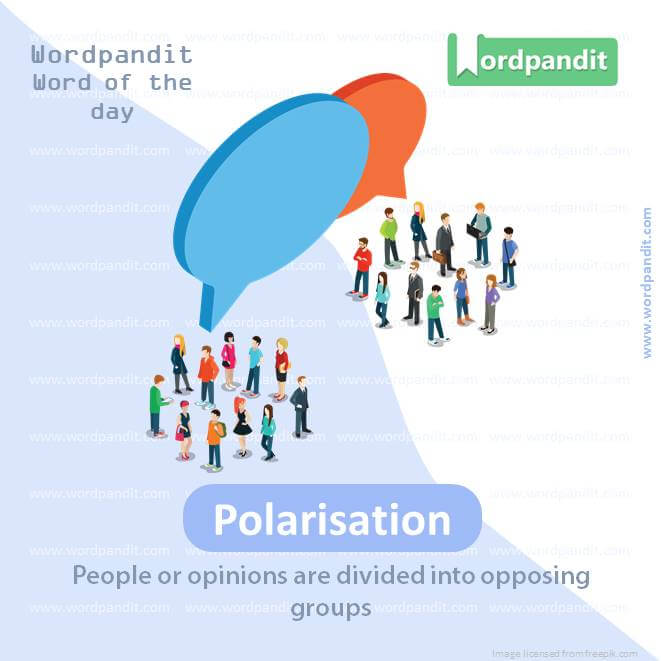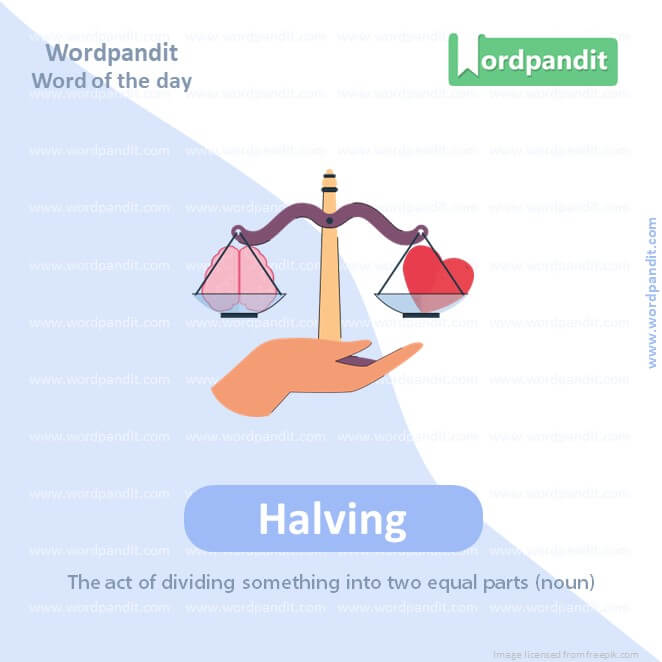Daily Vocabulary Words: Enhance Your Lexicon with Leading Newspapers & Publications
Welcome to the Daily Vocabulary section at Wordpandit!
Our mission is straightforward: to bring you essential vocabulary words featured in top newspapers and publications worldwide. By focusing on words you’ll encounter in renowned sources, we aim to help you enhance your vocabulary effectively and practically.
Our selection includes words from:
– The New York Times
– The Washington Post
– Scientific American
– BBC
– The Guardian
– Psychology Today
– Wall Street Journal
– The Economist
– The Hindu
– The Times of India
– The Economic Times
– Hindustan Times
– Live Mint
– The Indian Express
– And many more.
We are committed to your vocabulary development. Simply visit this section regularly and explore the daily posts. This is your go-to repository for commonly used words, providing significant practical benefits by familiarizing you with vocabulary from the leading publications listed above.
Make it a habit to visit our website daily and expand your lexicon with words from top newspapers and publications.
WORD-1: RIGOROUS
CONTEXT: Employers disregard institutional certification and have their own rigorous assessment of a candidate’s academic achievements and suitability for employment.
SOURCE: The Hindu
EXPLANATORY PARAGRAPH: Imagine if you had to clean your room, and your parent told you to make sure everything is perfect—no toys on the floor, no dust on the shelves, and everything super clean. That means you have to work very hard and be very careful. That’s what “rigorous” means—doing something with a lot of effort and making sure it’s done just right.
MEANING: Something that is done with great attention to detail and care, often involving a lot of effort (adjective).
PRONUNCIATION: RIG-er-us
SYNONYMS: thorough, strict, intense, precise, exacting, demanding, meticulous
USAGE EXAMPLE:
1. The teacher’s rigorous grading made sure students learned the material well.
2. Training for the marathon required a rigorous exercise routine.
3. The scientist conducted a rigorous experiment to ensure accurate results.
4. Passing the rigorous test required hours of study.

WORD-2: POLARISATION
CONTEXT: The mass media plays a pivotal role in opinion-making. However, instead of informing the electorate, the media often contributes to polarisation.
SOURCE: The Hindu
EXPLANATORY PARAGRAPH: Imagine two groups of people who used to play together, but now they only want to play with their own group and not with the other. They’ve become very different from each other and don’t agree on things. This is called “polarisation,” when people or things move apart and don’t mix or agree anymore.
MEANING: The process of dividing or separating into two very different groups or opinions (noun).
PRONUNCIATION: poh-luh-RAY-shun
SYNONYMS: division, separation, split, divergence, opposition, segregation
USAGE EXAMPLE:
1. The polarisation of opinions made it hard for the group to agree on anything.
2. Political polarisation often leads to arguments and disagreements.
3. The polarisation of the two teams made it difficult to find common ground.
4. Social media sometimes increases polarisation by showing only one side of an issue.

WORD-3: HALVING
CONTEXT: The second-largest component of the services economy, the omnibus trade, hotels, transport, communication and broadcasting sector — also a large provider of jobs — is estimated to witness more than a halving in the pace of growth — to 6.3%, from 14% last fiscal.
SOURCE: The Hindu
EXPLANATORY PARAGRAPH: Imagine you have a big cookie, and you want to share it with your friend. So, you break it into two equal pieces, giving each of you half. That’s called “halving,” when you take something and split it into two equal parts.
MEANING: The act of dividing something into two equal parts (verb).
PRONUNCIATION: HALV-ing
SYNONYMS: splitting, dividing, bisecting, cutting, reducing, sharing
USAGE EXAMPLE:
1. Halving the cake made sure both kids got the same amount.
2. The company is halving its prices during the sale.
3. Halving the recipe helped to make just the right amount of cookies.
4. They are halving the workload to make the project easier to handle.

WORD-4: SPIGOT
CONTEXT: The general election just ahead, policymakers face an unenviable choice — keep the spending spigot fully open to prop up growth at the risk of fiscal slippage, or tighten the purse strings and risk further loss of momentum.
SOURCE: The Hindu
EXPLANATORY PARAGRAPH: A “spigot” is like a little door that opens and closes to let water out. Imagine you have a garden hose, and when you turn the handle on the faucet, water comes out. That handle is called a spigot. It helps control the flow of water.
MEANING: A small faucet or valve for controlling the flow of liquid from a container (noun)
PRONUNCIATION: SPIG-uht
SYNONYMS: faucet, tap, valve, nozzle, stopper, outlet
USAGE EXAMPLE:
1. She turned the spigot to fill the watering can with water.
2. The spigot on the barrel let out just the right amount of juice.
3. Make sure to close the spigot tightly, so the water doesn’t drip.
4. The garden spigot was leaking, so they called a plumber to fix it.
WORD-5: RAMPANT
CONTEXT: These vices may not be specific or exclusive to higher education institutions but could be rampant among them.
SOURCE: The Hindu
EXPLANATORY PARAGRAPH: Imagine if there were so many toys all over the house that it was hard to walk anywhere without stepping on one. When something is everywhere and hard to control, like too many toys, we say it’s “rampant.” It means it’s spreading all over the place.
MEANING: Something that is happening or spreading very quickly and in a way that is hard to control (adjective).
PRONUNCIATION: RAM-puhnt
SYNONYMS: widespread, uncontrolled, unchecked, unrestrained, excessive, pervasive
USAGE EXAMPLE:
1. Weeds grew rampant in the garden after the rain.
2. Rumors about the surprise party spread rampant through the school.
3. The city worked hard to control the rampant spread of the disease.
4. Littering became rampant in the park during the summer.

WORD-6: VITIATED
CONTEXT: Mulya Pravah 2.0 underscores the need for utmost transparency in administration and highlights that decision-making in higher education institutions must be solely guided by institutional and public interest, and not be vitiated by biases.
SOURCE: The Hindu
EXPLANATORY PARAGRAPH: Imagine if you made a beautiful sandcastle, but then someone stepped on it, making it all messy. When something good gets ruined or spoiled, we say it’s “vitiated.” It means it’s no longer as good as it was.
MEANING: Spoiled or impaired the quality or efficiency of something (verb)
PRONUNCIATION: VISH-ee-ay-tid
SYNONYMS: spoiled, damaged, corrupted, tainted, impaired, ruined
USAGE EXAMPLE:
1. The once beautiful painting was vitiated by the water damage.
2. The plan was vitiated by a lack of resources.
3. His reputation was vitiated by false rumors.
4. The taste of the food was vitiated by too much salt.
WORD-7: ADHERED
CONTEXT: The authorities in and officers of universities must ensure that the provisions of their acts, statutes, ordinances and regulations are strictly adhered to in letter and spirit.
SOURCE: The Hindu
EXPLANATORY PARAGRAPH: Think about when you use glue to stick two pieces of paper together, and they stay stuck. When something sticks to something else, like glue on paper, we say it “adhered.” It means to stay attached or to follow closely.
MEANING: To stick to something firmly or to follow rules or instructions closely (verb).
PRONUNCIATION: ad-HEERD
SYNONYMS: stuck, clung, attached, followed, obeyed, respected
USAGE EXAMPLE:
1. The label adhered to the bottle perfectly.
2. She adhered to the teacher’s instructions during the project.
3. The sticker adhered tightly to the wall.
4. He adhered to his diet and lost weight.

WORD-8: CONDUCIVE
CONTEXT: It reminds them to act in the best interest of their institution, create a conducive culture and work environment for teaching, learning, and research and develop the potential of their institution.
SOURCE: The Hindu
EXPLANATORY PARAGRAPH: Imagine you’re trying to build a tall tower with blocks, and you need a flat, steady table to make sure it doesn’t fall. If the table is just right, it helps you build the tower. That’s what “conducive” means—something that helps make something else possible.
MEANING: Making a certain situation or outcome likely or possible (adjective)
PRONUNCIATION: kun-DOO-siv
SYNONYMS: helpful, favorable, supportive, beneficial, advantageous, encouraging
USAGE EXAMPLE:
1. A quiet room is conducive to studying.
2. The bright lights were conducive to growing healthy plants.
3. The teacher created a conducive environment for learning.
4. Good weather is conducive to outdoor activities.
WORD-9: BEMUSING
CONTEXT: The emphasis on the need for and the importance of maintaining the confidentiality of information is bemusing as it runs counter to the right of information as an instrument to ensure accountability.
SOURCE: The Hindu
EXPLANATORY PARAGRAPH: Imagine if you were trying to solve a puzzle, but it was really tricky, and you couldn’t figure it out right away. You’d feel a little confused or puzzled. That’s what “bemusing” means—it makes you feel a bit puzzled or confused.
MEANING: Causing someone to be confused or puzzled (adjective).
PRONUNCIATION: bih-MYOO-zing
SYNONYMS: confusing, puzzling, baffling, bewildering, perplexing, mystifying
USAGE EXAMPLE:
1. The magician’s tricks were bemusing to the audience.
2. The complex instructions were bemusing for the new employee.
3. Her answer to the question was bemusing and didn’t make much sense.
4. The bemusing riddle had everyone scratching their heads.
WORD-10: COLLEGIALITY
CONTEXT: The idea of collegiality must require the administration to engage with and consult stakeholders in decision-making.
SOURCE: The Hindu
EXPLANATORY PARAGRAPH: Imagine working together with your friends on a project where everyone helps each other, listens to ideas, and works like a team. That’s what “collegiality” means—working together in a friendly and cooperative way.
MEANING: The relationship and cooperation between colleagues who work well together (noun).
PRONUNCIATION: kuh-lee-jee-AL-i-tee
SYNONYMS: cooperation, teamwork, camaraderie, partnership, collaboration, fellowship
USAGE EXAMPLE:
1. The office had a strong sense of collegiality, making it a great place to work.
2. Collegiality among the teachers helped create a positive learning environment.
3. Collegiality between team members led to a successful project.
4. The collegiality in the company encouraged everyone to share ideas freely.
Vocabulary Hard Words
The experience of unraveling the depths of language learning often leads us to ‘vocabulary hard words’. These challenging jargons might seem daunting initially, but with the right learning strategies, the enigma of ‘vocabulary hard words’ can turn into an enticing quest. But how can these ‘vocabulary hard words’ be learned effectively?
Firstly, to master ‘vocabulary hard words’, it’s vital to break down the process into manageable steps. Instead of tackling several words at once, focus on understanding a few each day. This gradual approach ensures effective retention and understanding.
Multimedia resources tremendously aid in comprehending ‘vocabulary hard words’. Movies, podcasts, or even music in the target language contribute a comprehensive perspective. They provide real-life contexts and usages of ‘vocabulary hard words’, making them more understandable and less intimidating.
The incorporation of memory-enhancing techniques, such as flashcards or digital apps, can significantly bolster the retention of ‘vocabulary hard words’. Such tools encourage active recall, helping to cement these words into your long-term memory. Mnemonic devices can also aid in making these words more approachable by associating the hard words with relatable images or stories.
Practice is decisive when learning ‘vocabulary hard words’. Using these words in your conversations, written communications, or even social media posts will facilitate a robust understanding and recall.
Finally, do not worry about making mistakes while using ‘vocabulary hard words’. Mistakes are essential stepping stones in the learning process. They provide insights into areas that need more focus and help refine your grasp over these words.
In conclusion, grasping ‘vocabulary hard words’ is undoubtedly a challenging task but not an insurmountable one. With the aid of effective strategies including graded learning, multimedia resources, memory-enhancing tools, and regular practice, the process of mastering ‘vocabulary hard words’ can become an engaging and rewarding journey.













